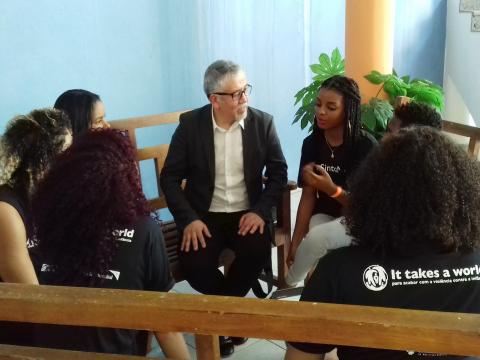International Day of the Girl: A call to redouble our efforts to achieve gender equality

By Patricio Cuevas-Parra, Senior Policy Adviser, Child Participation and Rights, World Vision International
The International Day of the Girl is a reminder of the need to address the challenges that girls experience in any corner of the world, from the richest to the poorest countries and it is a call to uphold human rights and empowerment as one of the core basis of an egalitarian society.
Recently, I wrote a paper based on research I am doing about empowerment and identity. As I wrote, I was profoundly moved and utterly inspired by the information I had collected from interviews with girls. They shared the challenges of being a girl in a society that values boys over girls; the imposed feelings of inferiority and the need to constantly prove their worth to others. One the girls told me, “I have been almost my entire life hearing endless rhetoric about boys being more important than girls, being praised for being beautiful but no reassurance on our skills and abilities, and the never-ending feeling of being harassed infinite times just for being young, female, black, poor and live in the outskirts.”
Despite the challenges they described, I was unreservedly impressed with their strength, determination and interest in reconstructing inequality and unfairness rather than to accept blindly assumptions, perceptions and restrictions deeply rooted in traditional patriarchal norms and beliefs. One of the girls said, “We have learned to value and empower ourselves; no one can do it for you. When we are empowered, we are reaffirming of identity and resistance, which makes it possible to grow and thrive. I believe we have been able to make that change.”
Being a girl or a boy has an impact on the life of an individual from birth to adulthood based on the different roles and opportunities culturally assigned within the family as well as society-at-large. The complexities of girls’ lives confirm that there is not a universal or standardised experience of what it means to be a girl; on the contrary, their lives are determined by their identities, social relationships, diversity of backgrounds and inequalities that vary from country to country and indeed globally, from region to region. The simplification and homogenisation of girls as a social group undermine the uniqueness of their particular identities as well as the way they construct and reconstruct the meaning and significance of their experiences.
These intersectional identity categories are linked to inequality and in many cases are grounded in policies and practices that perpetuate inequalities. These are the ones that require immediate action for change. For instance, gender is strongly connected with power relationships and linked to girls’ and boys’ decisions and influences their actions, motivations and the way they perceive themselves, whether consciously or unconsciously. Furthermore, girls could be discriminated against based on their ethnicity, race or socio-economic status.
Gender inequality is one of the root causes of violence against girls, which is one of the most pervasive human rights violations. This international day is an opportunity to commit efforts to eradicate harmful cultural and social norms that support violence against girls. For instance, the World Vision campaign, It takes a world is challenging and shifting attitudes, beliefs, and behaviours that condone violence against girls in line with the 2030 Agenda for Sustainable Development that set out a strong mandate to eliminate all forms of violence against girls and of all harmful practices.
As we mark the International Day of the Girl, it is critical to understand how girls are subject to multiple issues of inequality, stigma and stereotyping, many of which are invisible due to the tendency to naturalise these disparities. Let’s redouble our efforts to ensure the empowerment of girls and the fulfilment of their human rights. To make this happen, we do not need to go to the most deprived regions of the world; we can start making a change in our own family, neighbourhood or country.
About the author
Patricio Cuevas-Parra is currently the Senior Global Policy Adviser for Child Participation and Rights with World Vision International where he leads strategies and programmes to ensure that children and young people’s participation is at the centre of the advocacy and policy debate. He has a keen interest in looking at cutting-edge child rights advocacy tools and models to enhance children and young people engagement in decision-making.